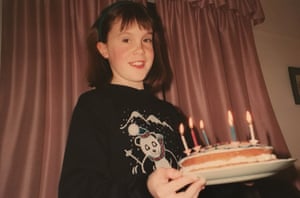Being one of only four million ‘leaplings’ in the world born on 29 February means feeling both a different and unique – and also prompts lots of questions

“I’ve never met one of you before.”
That’s the first thing most people say upon hearing that I was born on 29 February . It’s a fair comment. There are only four million leap year babies – or “leaplings” – in the world, out of of a population of over seven billion. So we’re pretty rare, if not quite as alien as that initial comment suggests.
Others always find my birthday fascinating and want to how how it feels to only have a birthday every four years. They brim with questions, they try and work out how old I really am – which reveals a lot of poor arithmetic skills – and they generally make me feel just a little bit different from everyone else. I’ve gotten used to feeling a little bit different over time, but as a child, when fitting in was everything, and birthday parties were the center of social calendars, I’m not sure I liked it much. But as I’ve grown older, I’ve embraced it and come to see my birthday as interesting and memorable – something that stands me apart.
I’m always asked when I celebrate my birthday on non-leap years and my answer has changed over time. Growing up, I was adamant: 28 February! I was a February baby, after all; I didn’t belong in March! But as an adult I’ve become more pragmatic. I’m still partial to February but I veer towards celebrating on whichever day is better suited to drinking and partying. Sometimes I just pick the nearest Friday or Saturday and decree that to be my “non-birthday”. (Legally speaking, it is something of a grey area. In the US there is apparently no statute or rule regarding my legal birthday on non leap years. The UK decrees it to be 1 March, whereas in New Zealand it’s 28 February. Good on New Zealand).
Growing up without a birthday three years out of four had its complications. I can’t recall the first time I became aware that my birthday was different from everyone else’s, I just knew it was. I do remember being about to turn eight years old, probably the first time I was really cognisant of the fact I had a “real” birthday that year. Being a willful child, I demanded that I should be allowed to open my presents on the 28th as it wasn’t “fair” to wait an extra day. My parents were having none of it.

Things were trickier at school. Often classes would be divided into groups based on birth month and the other kids would say that I didn’t have a real birthday so I shouldn’t be in either the February or March group. Sometimes there’d be teasing. My 12th birthday was met with “hilarious” comments from friends about how really I was only three, a joke that still continues today.
I’ve lost count of the childish birthday cards I’ve received on leap-year birthdays with garish badges proclaiming an age that’s only a quarter of the one I’m actually turning. On non-leap years, friends would often simply forget my birthday, or more cruelly, revel in telling me I didn’t have one.
Technology has also been unkind. A rudimentary computer programme at my secondary school would generate each student a birthday card and unfortunately it was not sophisticated enough to assign me a different day on non-leap years. No card for me.
The advent of Facebook had a similar effect. In its earlier years, the social network didn’t recognise the non-leap year birthdays, and given few people now use actual diaries to remember birthdays or send physical cards, my wall would be bare of the electronic birthday love that marks the passing of the years these days. This has since been remedied and Facebook actually awards me two days to celebrate, meaning my friends now get double the chance to wish me well. See, I am special!
So far, I’ve never celebrated a major milestone birthday on a leap year. My 18th, 21st and 30th birthdays were all marked on 28 February. I was lucky a friendly Cambridge barman took pity on me on my 18th birthday and served me alcohol despite my ID clearly stating I wasn’t of legal drinking age until the next day. (Although, that might be more of a comment on the prevalence of under-age drinking in English provincial towns in the late 90s than on any birthday-related kindness.) My 40th birthday will, of course, fall on a leap-day in four years time. Maybe I’ll go all out with a tenth birthday party theme.
I’ve only ever met one fellow leapling, one in fact that shared my exact birthday: 29 February 1980. We met while watching a cricket match in London one summer. I wasn’t really sure how to feel about it. Being born on 29 February was my thing, something unique to me, and it felt strange to have a conversation about our shared experience of growing up without a birthday three years out of four. Competitive even. Who had the most heartbreaking stories about forgotten non-birthdays, or had had the biggest blow-outs on leap years. But we became Facebook friends nonetheless, and sent each other some mutual non-birthday love for a year or two, making jokes about being eight and a quarter and so on.
Perhaps it’s the lack of a “real” birthday that makes me make an effort to arrange some sort of event for it every year. From house parties, to ski trips, to big dinners with lots of friends in lovely restaurants, I always do something to mark my birthday, real or otherwise. While many people choose to ignore their birthdays as they get older, I actively embrace mine and try to make a big deal of it, perhaps in an attempt to make it actually exist, to stop people from forgetting; or perhaps safe in the knowledge that I can quip about being only a fraction of the age I am. Just think, I’ll be 84 when I reach 21 in leap-day years. The flip side is I’ll look pretty haggard for a 21-year-old!
This year, when I turn 36 (or 9, depending on which way you look at it) a close friend is coming from London to my newly adopted hometown of New York City to celebrate with me and mark the “real” day. Born on 25 December, she knows a thing or two about having an unusual birthday. But that’s another story.




